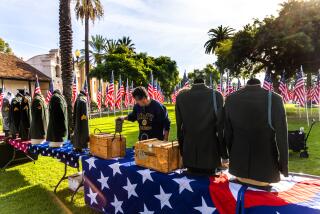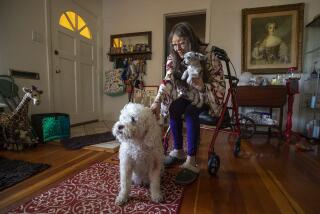After 61 Years, U.S. Veteran Meets Man Who Saved Him
LAVANNES, France — The gesture was simple and unbidden. With two weathered fingers, French farmer Marcel Jonoux softly touched the lined forehead of Los Angeles amateur artist Gustave “Bud” Plochere.
“Ah, bon,” Jonoux said, tracing an old wound. “C’est bon.”
It was the second time the two men were meeting.
This encounter Saturday was graced with laughter and storytelling, champagne toasts and an exchange of gifts. Dominique Dutartre, mayor of Lavannes, made Plochere an honorary citizen. Plochere presented Jonoux with a plaque.
Each man thanked the other, and in the way of men who have seen so much, there were no tears. Only a long hug.
Jonoux, 80, with bushy eyebrows and a ramrod-straight back, and Plochere, 82, who still bicycles three or four times a week, first met and became heroes to each other 61 years ago.
On Oct. 2, 1944, as the Allies pushed Hitler’s army eastward, Plochere’s P-47 Thunderbolt warplane crashed into a field where Jonoux was working. Jonoux thanked God that Plochere had guided his wounded plane into a field instead of the village full of people. Plochere thanked God that someone had pulled him out of the wreckage.
As the fighter plane broke in half, Jonoux dashed to the cockpit, certain the pilot was dead. Amid smoke and the heat of a crackling fire Jonoux took out a pocketknife to cut through rubber and the straps that held Plochere in his seat.
Just when it seemed too late, the straps loosened. Jonoux reached for Plochere’s head, which had slammed into the cockpit instruments.
“The wound was so deep,” Jonoux said, “that my fingers almost touched to his brain.”
Still, Jonoux said, he knew the young pilot was alive. So with the help of a neighbor, Robert Jean Leroy, he dragged the unconscious Plochere out and put him onto a hay wagon.
The wagon went into Lavannes, a village of 100 people about six miles outside Reims. Jonoux waited by the plane as American soldiers came. The soldiers wanted to know where the pilot was. Jonoux pointed. And that was all he knew about Plochere until about a year ago.
Plochere knew even less about Jonoux.
To this day, Plochere said, “I have no memories of anything two weeks before the crash and until two weeks after.” Plochere woke up in a British hospital encased in a full body cast. In addition to the head wounds, he had a broken back.
After Plochere returned home to Los Angeles, he was unable to find anyone to tell him the story of the crash.
“I believe I was testing a new engine,” Plochere said. “That’s all I knew.”
Until a simple housecleaning exercise, Jonoux didn’t know who the pilot was. Jonoux’s brother found a letter among their father’s papers. It was from an American lieutenant colonel thanking the people of Lavannes for saving a pilot named Gustave Plochere.
With a name, Marcel’s grandsons Fabrice Mathieu Jonoux, Jerome Jonoux and Benoit Jonoux began searching the Internet. Luckily the name Gustave Plochere was uncommon, and there was only one of a certain age.
The grandsons wrote a letter to Plochere, who had been a member of the Army’s 9th Air Force, the 362nd Fighter Group and the 379th Fighter Squadron. They asked if he was the Gustave Plochere who had crashed in October 1944.
Plochere sent a letter back, but it never reached them.
A couple of months ago, Plochere mentioned the letter to his cycling friends, Leo and Muriel Schuerman. All three belong to the Los Angeles Wheelmen cycling club and are huge fans of the Tour de France.
The Schuermans travel every year to Interbike, a cycling equipment convention in Las Vegas. It was there, seven years ago, that they became friends with Joel Glotin, who owns a cycling equipment company in Orleans, France.
Glotin found Jonoux and helped arrange Saturday’s meeting. Plochere traveled with Leo Schuerman to Paris and met with Glotin on Saturday at a hotel near Charles de Gaulle International Airport.
Glotin drove them through an early snowstorm, 95 miles northeast to Reims, the center of France’s champagne-producing region.
It was in the parking lot of a local hotel that Jonoux and Plochere met face to face.
With Glotin serving as interpreter, Jonoux, his wife, Christiane, Plochere and Schuerman haltingly exchanged stories over lunch. Jonoux wanted most of all to know about Plochere’s family.
He has been divorced for more than 25 years, has a daughter and three grandchildren, Plochere said. He most wanted to know how it was his plane crashed and he ended up rescued.
Jonoux told of watching Plochere’s plane fly in loops and turn on its back. It was after one of these turns, Jonoux said, that he heard, “Putt, putt, putt, pfft,” bad news in any language.
Jonoux told Plochere of his own three children. “And I have not only grandchildren but great-grandchildren.”
Plochere explained how he came back to Paris in 1948 with dreams of becoming an artist. “I found out I wasn’t good enough,” he said, “so I went home and took over the family business.”
Plochere’s father, also Gustave, had been born in Strasbourg, France, and had been blessed with a sense of color and style. Plochere Color Systems, where Gustave still works today, helps designers choose and coordinate colors.
Jonoux farmed rented land until 1969, when he opened the first self-service gas station in Reims.
After lunch, the party moved to the field where Plochere had crashed, to Lavannes city hall and to the town cemetery across the street, which includes a dozen graves of British Royal Air Force pilots who had also crashed near Lavannes.
Plochere shivered in the cold and wiped his eyes as he read the names of the downed fliers. Jonoux’s brother wrapped a scarf around Plochere’s neck and placed a jacket over his shoulders.
Inside city hall, the mayor thanked Plochere for fighting to save France. Plochere thanked Jonoux for saving his life.
After the toasts and slices of cake and conversations conducted through Glotin, plans were made for a tour of Reims the next day. Phone numbers were traded.
The grandsons practiced their English and blushed when Plochere told them over and over how well they had done to find him.
The snow had stopped but it was nearly dark. The party slowly broke up. “Au revoir,” Marcel Jonoux said.
Plochere bowed his head. “A demain,” Plochere said. A bit of French. Until tomorrow.
More to Read
Sign up for Essential California
The most important California stories and recommendations in your inbox every morning.
You may occasionally receive promotional content from the Los Angeles Times.










